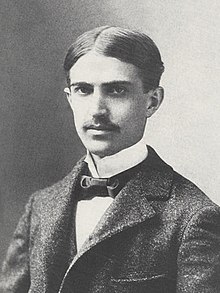In
Heaven,
Some little blades of grass
Stood before God.
"What did you do?"
Then all saves one of the little blades
Began eagerly to relate.
The merits of their lives
This one stayed a small way behind,
Ashamed.masterpiece
Presently, God said,
"And what did you did?"
The little blade answered,"Oh, my Lord,
Memory is bitter to me,
For, if i did good deeds, I know not of them."
Then God, in all his splendour,
 |
| Sir Stephan Crane |
Arose from His throne.
"Oh, best little blade of grass !"He Said.
|
Stephan Crane
Stephan crane (1871-1900) was born in New
Jersey, USA. He worked as a Journalist
before attempting to publish his
first readership. However, his
next novel, The Red Badge of Courage (1985) was hailed as a masterpiece.He came to England in 1897 where his novel was more warmly received. His other works include two volumes of poetry and short stories. He died of tuberculosisin 1900.
|
Explanation:-
In
these lines the poet says
that once there was some little blades of grass standing before God, in Heaven.
God Almighty asked them how they have spent their lives in the world. All of
them one by one begin to state their good deeds that they have done in their
lifetime and which they wanted to be honored or rewarded. One of the blades
there was a small one of it. It looked very shy and waiting for his turn. When
it was his turn, the God asked and what have you done through your whole life.
The little blade answered that he cannot remember his deeds either they were
good or bad. Then God get up in all his great & Impressive beauty, Quality
and brilliance from his throne and called the little blade of grass as the
best.
Generally:-
This
poem is an imaginary situation of the poet in Heaven. But actually there is a
message or moral hidden behind these lines. As you know that there are
different kind of people around us. Some of them are rich people, some are poor
people and some of them are in between the given two. Some of these people
are in need of other’s people help and some of them are helpful to the needed
one. This chain reaction is continuous as I help you, you will help the others
and the others will help someone else. We appreciate their effort. But some of
the people wants themselves to be honored of their good deeds. And if you will
be looking out for a reward of your deeds from any person, then you have
spoiled the chance of being rewarded from your Lord in account of your good
deeds.
Islamic Point of view:-
Those
who spend their wealth in the way of Allah and do not follow up their spending
by stressing their benevolence and causing hurt, will find their reward secure
with their Lord. They have no cause for fear and grief.
To
speak a kind word and to forgive people's faults is better than charity
followed by hurt. Allah is All-Sufficient, All-Forbearing
Believers!
Do not nullify your acts of charity by stressing your benevolence and causing
hurt as does he who spends his wealth only to be seen by men and does not
believe in Allah and the Last Day. The example of his spending is that of a
rock with a thin coating of earth upon it: when a heavy rain smites it, the
earth is washed away, leaving the rock bare; such people derive no gain from
their acts of charity. Allah does not set the deniers of the Truth on the right
way. (2:262 - 264)
Look,
you are being called upon to expend in Allah's Way, yet some of you are being
niggardly, whereas the one who is niggardly is, in fact, being niggardly only
to himself. Allah is Self-Sufficient: it is you who are the needy. If you turn
away, Allah will replace you by another people, and they will not be like you.
(47:38)
You
shall not attain righteousness until you spend out of what you love (in the way
of Allah). Allah knows whatever you spend. (3:92)
(O
Prophet!) Tell those of My servants who believe that they should establish
Prayer and spend out of what We have provided them with, both secretly and
openly, before there arrives the Day when there will be no bargaining, nor any
mutual befriending. (14:31)
Allah
does not love the arrogant and the boastful, who are niggardly and bid others
to be niggardly and conceal the bounty which Allah has bestowed upon them. We
have kept in readiness a humiliating chastisement for such deniers (of Allah's
bounty) (part of 4:36 and all of 4:37).
I wish you have a lesson from it and I am sorry
for any kind of mistake.







I Must Say It is really Good
ReplyDelete